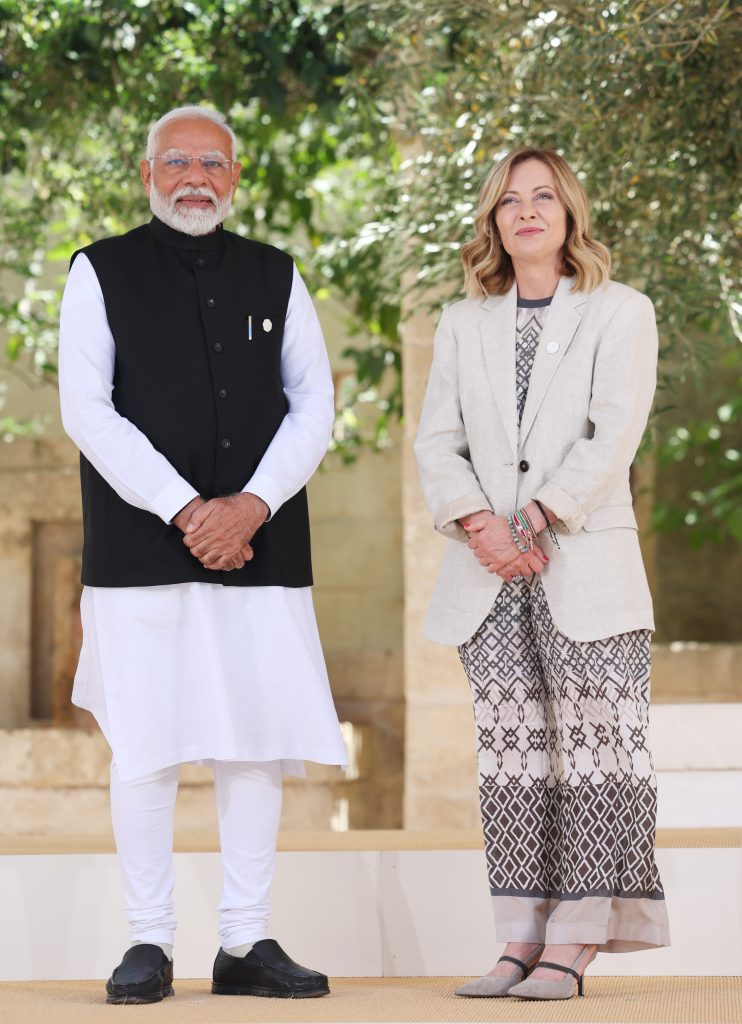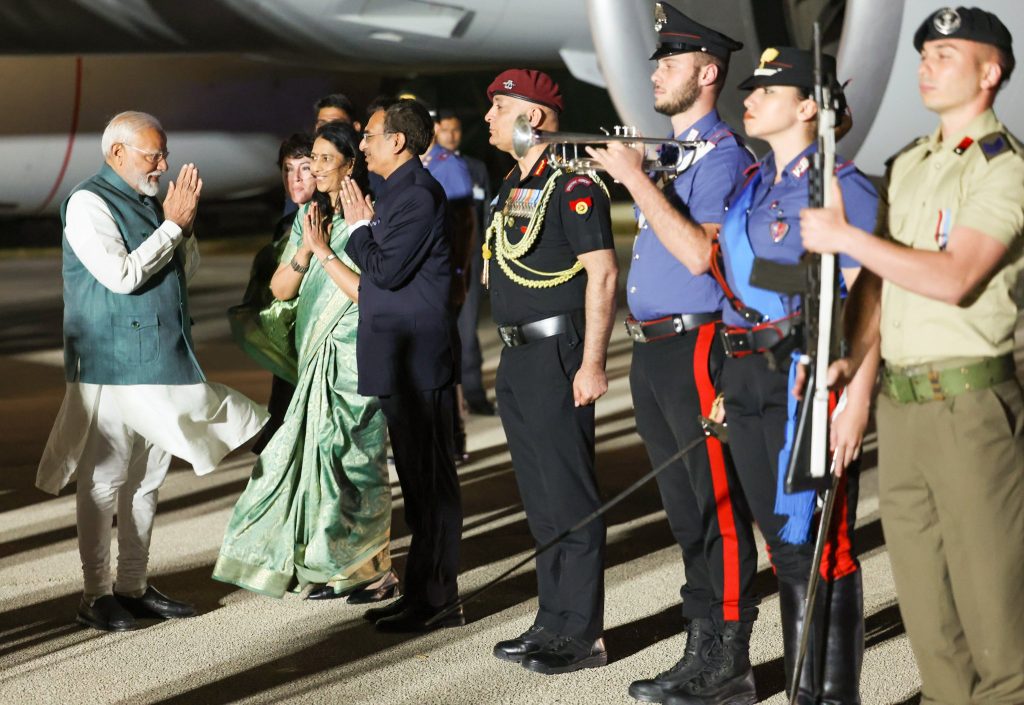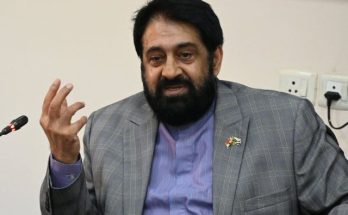
In an insightful conversation with Manish Chand, CEO of the Centre for Global India Insights and India Writes Network, Vani Saarju Rao, India’s Ambassador to Italy, discusses the key outcomes of Prime Minister Modi’s recent talks with Italian Prime Minister Giorgia Meloni on the margins of the G7 summit in Puglia, Italy. Ambassador Rao highlights the growing cooperation between India and Italy in trade, defence, and technology, and the mutual benefits of leveraging each nation’s strengths.
Q) How do you assess PM Modi’s talks with Italian PM Giorgia Meloni ? What were the key outcomes? In which specific areas can we expect marked momentum in the coming days?
PM Modi had an excellent meeting with Prime Minister Meloni. A leader-level rapport is always beneficial, enabling both governments to be more aspirational regarding the bilateral agenda. The two governments seek to do more in two or three key areas. One is the political dialogue, which they aim to maintain and continue, covering both bilateral and global issues.

Secondly, trade and investment ties between the two countries are still very low. There is a keen interest in diversifying these, and exploring more collaborations to benefit from each others technologies and complementary strengths. The defence and security domain is also a significant area of focus. All these areas saw exchanges of visits last year. Lastly, migration and mobility is an area of mutual interest. Given the demographics of both countries, the exchange of professionals, researchers, and students will be immensely valuable for both sides.
Q) Enhancing defence industrial collaboration has become an important focus area for the India-Italy partnership. Are we looking at specific projects and joint production models in this area? What can we expect in terms of defence collaboration?
A) We are looking at broadening the overall defence engagement across various pillars. One is, of course, the ministerial dialogue between the Raksha Mantri and his Italian counterpart, who visited here last year. Secondly, there is an institutional framework, a dialogue called the Joint Defence Committee, which met earlier this year, co-chaired by the Defence Secretary after a long time. Service-to-service exchanges are extremely important for defence cooperation. This includes participation in each other’s military exercises, port visits by ships, and training of each other officers. These are some of the pillars of our defence cooperation. \
In addition to that, we are looking at how we can connect the defence PSUs and industries on both sides. Italy has certain niche capabilities, while India has strong manufacturing strengths. The objective is to leverage these two different ecosystems in a way that benefits both countries and economies. Also linked with defence is the deepening strategic convergence, especially in crucial geographies like the Indo-Pacific.
Q) How do you see bilateral cooperation in the Indo-Pacific progressing? What can India and Italy do together in this region?
A) In recent years, Italy has focused more on the Indo-Pacific region, viewing India as a key and strategic partner in the Indo-Pacific, and a very important economic partner in Asia. This is evident not only in Prime Minister Meloni visits but also in the visits of Italian
naval assets to India, including two expected this year. Maritime cooperation
G7 – is crucial for both countries. Italy is among the Western countries that have joined India-led initiatives in our neighbourhood, such as the Indo-Pacific Oceans Initiative. They have also joined other key strategic initiatives like IMEEC and the Global Biofuels Alliance. The goal is to undertake joint activities in the Indo-Pacific, whether under the science and technology pillar of the IPOI, the International Solar Alliance, or other areas. It will be activity- oriented cooperation, and we need to map out some of these activities for the future.
Q) One of the major outcomes of the G7 summit in Puglia was the focus on Africa, highlighted by Italian Prime Minister Georgia Meloni and Mattei Plan. India, with its solid strengths, capacity-building initiatives, and successful companies, has a strong familiarity with Africa. How can India and Italy leverage each other strengths to partner in Africa?
A) Prime Minister Meloni’s Mattei Plan was launched just last December. It has some areas of focus. Africa is Italy’s neighbourhood, and they are looking at Africa for energy partnerships, regulating migration from Africa to Italy, and addressing key connectivity issues. India has had a long-standing G7 – presence in Africa, with a lot of goodwill and our own development partnership programmes there. We need to understand more about each other, models for extending development assistance and cooperation in Africa and identify areas of convergence. This will require more conversations. However, I believe there are complementary and convergent interests here, and the two foreign ministries can discuss these further. Moreover, the private sectors in both countries should explore partnerships. When talking about clean technologies or providing better healthcare infrastructure in African countries, the private sector can play a significant role. This will require more brainstorming and a deeper understanding of how we can work together.
Q) Some strategic experts are discussing the concept of the Indo-Mediterranean in the context of India-Italy cooperation. What does this mean?
A) Italy has come up with this wider Mediterranean strategy, which covers a vast geography and includes parts of the Indo-Pacific. For us, the area of intersection is in the African region. So again, this is an area where we are looking at what we can do together. Connectivity is one possibility; you may have heard that an Italian company called Sparkle is trying to provide an alternative and reliable digital connectivity network through undersea cables, specifically between Europe and Asia. These are some of the ideas that could be on the table. But as long as our strategic outlooks converge, I think we can keep talking to each other about how we can maintain peace, stability, and respect for a rules-based international order. Are there any new areas we are exploring where we will see more action in the future?
Migration and mobility is an area where more discussions are taking place. We have agreed to hold the first meeting of the Cybersecurity Working Group very soon, so that could be another area of focus. In Europe, there is a lot of interest in working with countries like India on artificial intelligence due to concerns about its malicious use. With Italy, in particular, there is much to see and learn. They excel in sectors such as agriculture, food processing,automobiles, and space. These are some areas where we, as an embassy, would like to focus on building collaborations between the two countries.
Q) You have been here now for a couple of months, and you are fortunate to have the Prime Minister visit right at the beginning of your ambassadorial tenure. What is your sense of the image of India among the Italian elite and political establishment? Do they see India as a rising power that needs to be supported?
A) Italians genuinely like India and Indian culture. I think there is a lot of comfort in sharing similar values. India is seen as a very stable and mature democracy, and our recent elections have reinforced that image. Secondly, in addition to being a country poised for robust economic growth, there is also a lot of respect for India regarding how we are leveraging digital technologies and tools to improve peoples lives. The success stories in India, such as UPI payments and financial inclusion, have made a very positive impression here.
Our successful hosting of the G20 last year and India ‘s advocacy for the expectations and aspirations of other developing countries as a leader of the Global South have also been recognised here. So, overall, I see a lot of positivity and respect for India, acknowledging the
journey it has made in the last couple of decades and its significant achievements. There is a strong desire to further enhance cooperation with India.
Author Profile
- India Writes Network (www.indiawrites.org) is an emerging think tank and a media-publishing company focused on international affairs & the India Story. Centre for Global India Insights is the research arm of India Writes Network. To subscribe to India and the World, write to editor@indiawrites.org. A venture of TGII Media Private Limited, a leading media, publishing and consultancy company, IWN has carved a niche for balanced and exhaustive reporting and analysis of international affairs. Eminent personalities, politicians, diplomats, authors, strategy gurus and news-makers have contributed to India Writes Network, as also “India and the World,” a magazine focused on global affairs.
Latest entries
 DiplomacyJanuary 5, 2026India walks diplomatic tightrope over US operation in Venezuela
DiplomacyJanuary 5, 2026India walks diplomatic tightrope over US operation in Venezuela India and the WorldNovember 26, 2025G20@20: Africa’s Moment – The Once and Future World Order
India and the WorldNovember 26, 2025G20@20: Africa’s Moment – The Once and Future World Order DiplomacyOctober 4, 2025UNGA Resolution 2758 Must Not Be Distorted, One-China Principle Brooks No Challenge
DiplomacyOctober 4, 2025UNGA Resolution 2758 Must Not Be Distorted, One-China Principle Brooks No Challenge India and the WorldJuly 26, 2025MPs, diplomats laud Operation Sindoor, call for national unity to combat Pakistan-sponsored terror
India and the WorldJuly 26, 2025MPs, diplomats laud Operation Sindoor, call for national unity to combat Pakistan-sponsored terror







